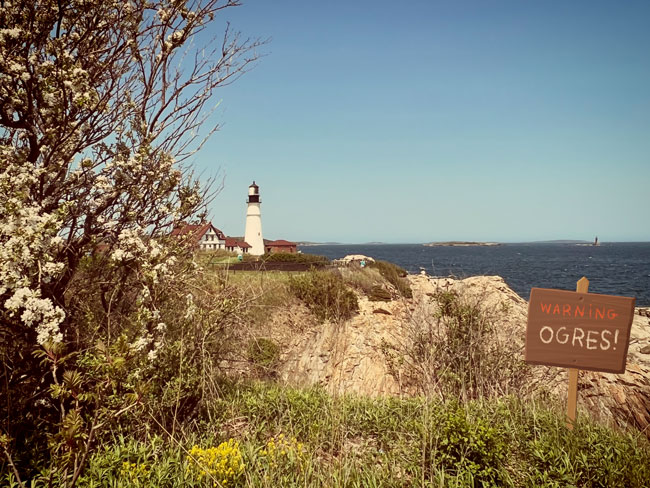
There are ogres in Maine.
My daughter Lucy and I were there for a speaking engagement in Portland. We spent some free time visiting the lighthouse, and Lucy paused to photograph some plants she saw along our path. (She is her mother’s daughter!)
Then, a crabby ogre emerged up over the cliff. Her vile breath slapped us in the face as she bellowed through rotten teeth, “That’s GARLIC MUSTARD. It’s a TERRIBLE weed!” And just like that, she disappeared from view, apparently returning to the dank cave she calls home.
Okay, it wasn’t an ogre. And she didn’t have bad breath or rotten teeth. But that is what she said, and in a manner that was equal parts ugly and condescending.
I am still at a loss in figuring out her goal.
If it was a public service announcement, she didn’t follow it up with any advice about what to do about this “terrible” weed. (Unless photographing it somehow condones it, bolstering its ego and encouraging it to spread even more?) She wasn’t a park ranger, so it wasn’t a three-second nature lesson.
The tone of her brief message did seem intended to shame Lucy for admiring it, as if only certain things are good and beautiful.
Thanks largely to the industrial media complex that grows wealthy by sowing conflict, we live in a polarized society, where every person, event, and issue is painted with a broad brush, instantly judged as either good or bad. People who disagree with us aren’t merely individuals with different opinions, they are our enemies, part of a larger group that must be defeated. There is no nuance, depth of thought, or acknowledgment that two seemingly opposing facts can be true at the same time.
Should we stop taking photos of the ocean because people drown in it sometimes?
Should we stop taking photos of roses because they have thorns that can prick you?
Should we stop taking photos of the sunset because the sun’s rays can cause cancer?
Are the ocean, roses, and sun “good”… or “bad?”
Now, I am aware that garlic mustard is an invasive species that wreaks havoc on ecosystems where it didn’t naturally originate. But I wonder if this woman knows that this “terrible weed” is also edible and an excellent source of vitamins and minerals with many helpful medicinal uses.
Not only was she a perfect example of our tendency to make extreme, instant, and absolute judgments on everything, but she’s also a classic example of Adultitis in action, dropping negativity and criticism to strangers. No potential solutions are shared, of course. No offer to help.
This should be a rule: you’re not allowed to criticize anything unless you have a solution to offer with it.
And so let me follow that rule. After all, I’ve spent all these words criticizing a woman I don’t know, painting her as an Adultitis-ridden ogre after she spoke seven words to us.
Here’s one example of what she could have said:
“My, what a beautiful photograph! The plant with the little white flowers is garlic mustard. It’s an invasive species in this area, crowding out some of the local plants and wildflowers. If you ever see any in your backyard, you can help keep it from spreading by pulling it up from the root and disposing of it in a black plastic garbage bag. Interestingly, it actually tastes like real garlic and is very nutritional. You can toss it in your salad and find many recipes online. Probably more than you wanted to know, but I thought you might be interested. Have a great day!”
That’s way more than seven words, but it’s also way more kind and useful.
Alas, it’s easy to recognize Adultitis in others and point out their faults. But what about in ourselves? Are there ever times when WE are the ogre? We can complain about the negativity we see on TV and the division that has proliferated throughout our society. But are we contributing to it by making snap judgments of our own? Are we quick to paint something as black or white, ignoring the many shades of gray? Are we offering solutions with our criticisms?
Maybe it’s asking too much to expect someone to engage in a thoughtful and friendly dialogue as I offered as an example. I know there are many times in my own life when the perfect words come too late after the moment has passed.
But the woman could have also taken a much easier alternative course of action: to say nothing.
As Thumper said in the 1942 classic movie Bambi, “If you can’t say something nice, don’t say nothing at all.”
Even that is better than scattering Adultitis into the world like a handful of garlic mustard seeds.